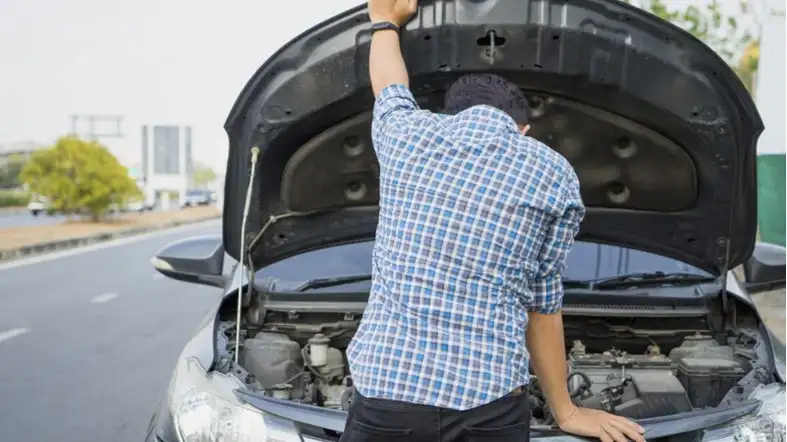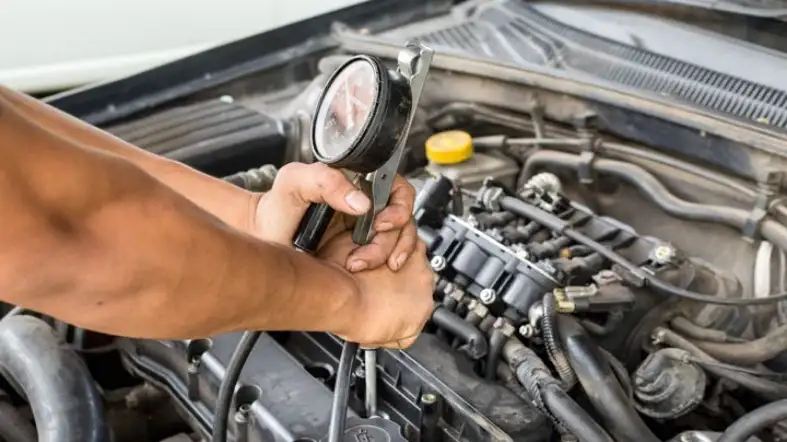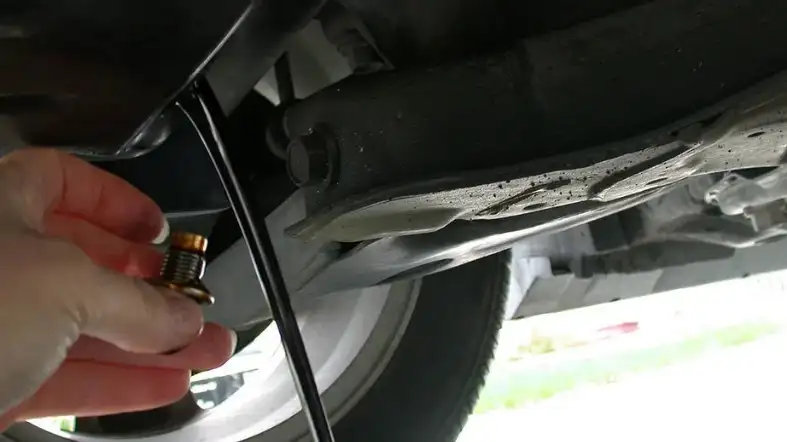Are you prepared for the nightmare scenario of your car’s engine locking up while you’re cruising down the highway? It’s a sudden and harrowing experience that no driver wants to face.
In this article, we dive into the world of engine lock-up. We’ll uncover the causes behind it, the warning signs to watch out for, and, most importantly, what to do if it ever happens to you.
So buckle up and get ready to explore this critical aspect of driving that every motorist should be aware of.

What Happens When An Engine Locks Up While Driving?
Here are some issues that you have to face when an engine locks up while driving:
Sudden Loss of Power
When an engine locks up while you’re driving, there’s a sudden and complete loss of power in your vehicle.
This means that the engine stops turning, and the wheels can’t receive any power from it.
Your car will slow down rapidly, and you won’t be able to accelerate or maintain your speed.
Steering and Brake Impairment
An engine lock-up can cause steering and brake impairment.
Since the engine powers essential components like the power steering and brake booster, their functionality can be compromised.
Steering becomes more difficult, and you might need to use more force to turn the wheel.
Braking can also be challenging, requiring stronger pressure on the brake pedal.
Warning Lights and Alerts
Modern vehicles have onboard computer systems that monitor various aspects of the engine.
When an engine lock-up occurs, warning lights and alerts on your dashboard might illuminate.
These warnings can indicate issues with the engine, oil pressure, or other critical systems.
Pay attention to these alerts, as they provide valuable information about the condition of your vehicle.
Increased Risk of Accidents
An engine lock-up can lead to an increased risk of accidents.
When your engine suddenly loses power, you might lose control of your vehicle, especially if you’re driving at high speeds or in traffic.
Other drivers might not anticipate your sudden slowdown, potentially causing rear-end collisions or other accidents.
Potential Engine Damage
The potential engine damage is a major concern when the engine locks up while driving.
This could happen due to a variety of reasons, such as a seized piston, a lack of lubrication, or a broken timing belt.
Internal components might collide and cause severe damage, resulting in costly repairs or even the need for a new engine.

What Causes the Engine to Lock Up While Driving?
Mechanical Failure
Engines are intricate machines with many parts working together. When certain parts like pistons, valves, or bearings wear out over time, they might not move smoothly.
This can lead to a sudden engine lockup as these parts clash and halt the engine’s operation.
Regular maintenance and inspections can help identify and replace worn out components before they cause a lockup.
Oil Issues
Engine oil is like the lifeblood of your car’s engine. It lubricates the moving parts, preventing them from rubbing against each other and causing friction.
Low oil levels or inadequate oil pressure can cause these parts to grind together, leading to an unexpected engine lockup.
Regularly checking your oil levels and changing the oil as recommended by your vehicle’s manufacturer can help avoid such problems.
Overheating
Engines can get really hot when they’re running, but if they get too hot, it’s a problem.
High temperatures can cause metal parts to expand beyond their limits, leading to a sudden engine lockup.
It’s crucial to keep an eye on your coolant levels and ensure your cooling system is in good condition.
If your engine starts to overheat, it’s important to pull over and let it cool down before you continue driving.
Timing Belt or Chain Failure
Think of the timing belt or chain as the conductor of your engine’s orchestra. It ensures all the moving parts are in sync.
If the timing belt or chain breaks or slips, it’s like the orchestra playing out of tune.
This can cause parts to collide and bring your engine to a screeching halt.
Regular replacement of the timing belt or chain as per your car’s maintenance schedule is essential to prevent such issues.

Hydrolocking
Engines need air to mix with fuel for combustion. But if water gets into the engine, it’s bad news. This is called hydro locking. It’s like trying to light a wet match the engine won’t work.
Driving through deep water or having a faulty air intake system can lead to this problem and result in a sudden engine lockup.
Avoid driving through flooded areas, and make sure your air intake system is functioning properly.
Fuel System Issues
Fuel is to your car what food is to you it’s essential for energy.
If your car’s fuel system has issues like a clogged fuel filter or a malfunctioning fuel pump, the engine might not get the fuel it needs to run smoothly.
This can lead to a stalled engine in the middle of your drive. Regular fuel system maintenance can help prevent such disruptions.
Electrical Failures
Cars are becoming more and more reliant on electronics. The ignition system and sensors are like the brains of your car. If they stop working, your engine might too.
Electrical failures can lead to a sudden engine lockup. Regularly checking your car’s electrical components and addressing any issues promptly can help prevent this.
Seized Alternator or Serpentine Belt
The alternator generates power to keep your car’s electrical systems running, and the serpentine belt helps power many crucial parts.
If the alternator seizes or the serpentine belt breaks, it can cause the battery to drain or important systems to stop working.
This can result in an engine shutdown. Regular belt inspections and addressing issues early can prevent these situations.
Clutch or Transmission Issues
Imagine your car’s transmission as a team of gears working together. If these gears get stuck or don’t coordinate well, it can lead to clutch or transmission issues.
These problems can prevent your engine from transferring power to the wheels, causing it to stall unexpectedly.
Regular transmission maintenance and being gentle with your clutch can help avoid these hiccups.

How Do You Fix an Engine that Has Locked Up?
Check Oil Levels
Begin by checking the engine’s oil levels. Low oil levels or inadequate oil circulation can lead to friction and overheating, causing the engine to seize.
If the oil level is low, add the appropriate type and amount of oil according to your vehicle’s specifications.
Attempt to Manually Turn the Crankshaft
Using a wrench or socket, try to manually turn the engine’s crankshaft. Apply gentle but firm pressure in the direction of normal engine rotation.
If the crankshaft turns, it might help free up any stuck components within the engine.
Apply Penetrating Oil
For engines that have been dormant for a while or are suffering from corrosion, applying penetrating oil to crucial components can help loosen them.
Allow the oil to sit for a while to penetrate and break up any rust or deposits.
Remove Spark Plugs
Remove the spark plugs from the cylinders. This reduces the compression within the engine and makes it easier to manually turn the crankshaft.
Be cautious not to damage the spark plugs during removal.
Use Heat
If the engine’s lockup is due to rust or corrosion, carefully apply heat using a heat gun or torch to the affected area. The heat can help expand the metal and potentially free up the seized components.
Address Underlying Causes
Once the engine is running again, it’s important to address the underlying causes of the lockup.
Perform thorough inspections and maintenance to prevent the issue from recurring.
Consult a Professional Mechanic
If your attempts to free up the engine are unsuccessful, it’s best to seek the expertise of a professional mechanic.
They have the knowledge and tools to accurately diagnose the issue and recommend appropriate solutions.
Follow Manufacturer Guidelines
Always follow the manufacturer’s recommendations for maintenance, oil changes, and inspections. Adhering to these guidelines can significantly reduce the risk of engine lockup.
FAQs
Can I restart the engine if it locks up while driving?
No, it’s not advisable to restart the engine if it locks up while driving. Attempting to do so can worsen the damage. It’s safer to pull over, turn off the engine, and call for professional assistance.
What causes engine lock-up during driving?
Engine lock-up can occur due to various reasons, including insufficient lubrication, overheating, mechanical damage, or a broken timing belt. These issues can cause the engine’s moving parts to seize.
Is engine lock-up dangerous while driving?
Yes, engine lock-up is a dangerous situation while driving. It can lead to a sudden loss of control and may pose risks to you and other road users. It’s essential to handle it promptly and safely.
Do I Need to Check Oil Levels Regularly?
Yes, checking your vehicle’s oil levels regularly is crucial to ensure proper lubrication and prevent engine lock-up due to low oil levels.
Are Warning Lights Always Indicators of Engine Lock-Up?
No, warning lights on the dashboard can indicate various engine issues, not just lock-up. They serve as important alerts to potential problems that should be investigated.
Does Overheating Always Lead to Engine Lock-Up?
No, overheating can lead to engine lock-up, but it doesn’t always result in it. Pulling over and allowing the engine to cool down can prevent lock-up in some cases.
Is DIY Repair Recommended for an Engine Lock-Up?
No, attempting a DIY repair for an engine lock-up can be complex and may cause further damage. It’s best to consult a professional mechanic for proper diagnosis and repair.
Conclusion
Experiencing engine lockup while driving is perilous. It results in sudden power loss, hampers steering and brakes, triggers warning lights and raises accident risks.
Engine damage is a real concern. Prioritize safety, adhere to protocols, consult a mechanic, and maintain your vehicle regularly to avert lock-ups.
Safety is paramount in such road emergencies.
